Culture Secretary appoints Blondel Cluff CBE as Chair of the National Lottery Community Fund
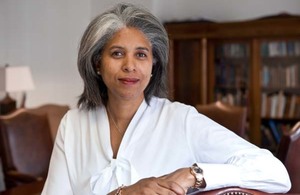
Blondel Cluff CBE
The role will see her set the long-term strategic direction for the largest funder of community activity in the UK, working with charities to enable people and communities to thrive.
During 2020 it distributed over £650 million, thanks to National Lottery players, delivering support to more than 13,000 community groups as part of the coronavirus response. Beneficiaries ranged from radio shows for patients in hospital to aid their recovery, to online music sessions for children and young people, helping tackle lockdown loneliness.
Growing up within a family from Anguilla,
Blondel has been a solicitor for more than 35 years, holding a number of high level public roles focused on communities, education, health and heritage over the past two decades.She was co-opted to the Prime Minister’s Commission on Race and Ethnic Disparities, with a focus on education, and is a member of the Windrush Cross Government Working Group, led by the Home Office.
Blondel recently retired from diplomatic service, having represented the British Overseas Territory of Anguilla, supporting the territory through Hurricane Irma, constitutional reform and in its preparations for Brexit as a border nation of the EU.
She remains as CEO of the West India Committee, a UK registered charity and Royal Charter institution that is the custodian of a UNESCO inscribed library and collection on the Caribbean and is a Consulting NGO of UNESCO on small island developing nations and heritage. During the past six years, she has served as chair of the National Lottery Heritage Fund’s London and South Committee and also chaired the London Committee of its predecessor, the Heritage Lottery Fund.
In 2018 she received a CBE for services to numismatic design and for her work with the Caribbean community in the UK and abroad.
Culture Secretary Oliver Dowden said:
Over the past year, the National Lottery Community Fund has distributed hundreds of millions of pounds to support our dedicated charities playing a huge role in the national effort against coronavirus, providing a lifeline to vulnerable people across the country.
I am delighted to appoint Blondel as its new Chair. Her extensive background in charity and community work means she is ideally placed to ensure Lottery funding helps us build back stronger from the pandemic and reflects the needs of people right across the UK.
Blondel Cluff CBE said:
Communities are the very lifeblood of a nation and, as such, I am honoured to have the opportunity to support them as Chair of the National Lottery Community Fund at such an important time for us all.
As per legislation the Secretary of State for Digital, Culture, Media and Sport has formal responsibility for the appointment of the members of the Board.
Ministers were assisted in their decision-making by an Advisory Assessment Panel which included a departmental official and a senior independent panel member approved by the Commissioner for Public Appointments.
She will replace interim chair Tony Burton CBE.
The most vulnerable and health and care workers offered COVID-19 jab as government hits target to protect those most at risk
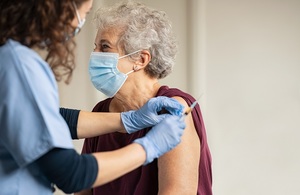
- The most vulnerable and those who care for them have been offered a COVID-19 vaccine as government target met on Sunday
- People in this group account for 88% of COVID-19 deaths
- Over a quarter of UK adult population have been vaccinated with first dose
As of Sunday 14 February, all care home residents and staff, health and social care workers, people aged 70 and over, and the clinically extremely vulnerable have been offered a vaccine. These groups account for 88% of deaths from COVID-19, meaning potentially tens of thousands of lives will be saved.
The health service across the UK has been working tirelessly to vaccinate those most at risk as quickly as possible after the government secured effective vaccines early and they passed stringent safety tests at the end of last year.
Since then the UK vaccination programme has accelerated with nearly 1,000 vaccines being administered a minute at one point and a record 598,389 first doses delivered in one day on 31 January.
More than 15.3 million people in the UK – more than a quarter of all adults – have now been vaccinated with their first dose.
The NHS is working hard to encourage the remaining people who have been offered a vaccine to come forward.
Health and Social Care Secretary Matt Hancock said:
I’m so proud of the team – we’ve hit this fantastic milestone in our battle against COVID-19. In less than 10 weeks we’ve jabbed over 15 million people across the UK.
That’s one in every 4 adults now starting to receive protection from this dreadful disease.
This accomplishment is thanks to the incredible efforts of frontline NHS workers, vaccine volunteers, the armed forces and all those working in local and central government. The vaccine rollout shows what our country can achieve working together.
There is so much more to do and I urge anyone eligible to step forward and take up their appointment. The vaccine is our route to freedom – we will beat this virus jab by jab.
As the milestone has been hit, from today NHS England has started offering vaccines to people in the next 2 priority groups as recommended by the Joint Committee on Vaccination and Immunisation (JCVI) – those aged 65 and over and people with underlying health conditions which mean they are clinically vulnerable to COVID-19
The government aims to offer a vaccine to all priority cohorts 1 to 9 by May and all adults by September.
As large numbers of people from at risk groups are vaccinated, we will be able to gather the evidence to prove the impact on infection rates, hospitalisation and reduced deaths. If successful, this should in time lead to a reassessment of current restrictions.
Until then it is essential that everyone continues to stay at home if possible whether they have had the vaccine or not. It’s as important as ever to stay at home to protect the NHS and save lives.
Vaccine Minister Nadhim Zahawi said:
The NHS has pulled out all the stops to vaccinate the most vulnerable people in every corner of the UK, saving lives and reducing pressure on the NHS.
I want to thank everybody involved in this mammoth operation which is the largest vaccination programme in our history.
The NHS will now focus on vaccinating people who have not yet come forward and people in cohorts 5 and 6. Everybody will get their second dose within 12 weeks and we’re confident we can offer vaccines to all those in cohorts 1 to 9 by May.
The government is following the advice of independent experts at the JCVI on which groups of people to prioritise for COVID-19 vaccines. The JCVI advised the priority should be to prevent deaths and protect health and care staff.
The vaccination programme continues to rapidly expand, with thousands of vaccination centres across the country providing people with easy access to a vaccine, regardless of where they live.
NHS Chief Executive Sir Simon Stevens said:
The speed and precision of this programme – focusing first on protecting people at highest risk – is testimony to the skill and dedication of NHS GPs, nurses, pharmacists, and many thousands of others who have all come together to make such a shared success of this well designed and brilliantly organised NHS vaccination campaign.
Delivering this major national milestone in just 10 weeks would be extraordinary at any time, but doing it in the teeth of the winter COVID surge – which has seen our hospitals looking after more than 100,000 severely ill coronavirus patients in just the last month alone – is a remarkable achievement.
The guidance from the government and the NHS to local vaccination services remains that they should still offer the vaccine to each of the priority groups in the order set out by the JCVI.
Background information
A total number of 15,300,151 people have received the first dose of a COVID-19 vaccine in the UK. 539,630 people have received their second jab.
The full list of priority groups is as follows:
- residents in a care home for older adults and their carers
- all those 80 years of age and over and frontline health and social care workers
- all those 75 years of age and over
- all those 70 years of age and over and clinically extremely vulnerable individuals
- all those 65 years of age and over
- all individuals aged 16 years to 64 years with underlying health conditions which put them at higher risk of serious disease and mortality
- all those 60 years of age and over
- all those 55 years of age and over
- all those 50 years of age and over
Through the government’s Vaccines Taskforce, the UK has secured access to 407 million doses of 7 of the most promising vaccine candidates, including:
- BioNTech/Pfizer for 40 million doses
- Oxford/AstraZeneca for 100 million doses
- Moderna for 17 million doses
- GlaxoSmithKline and Sanofi Pasteur for 60 million doses
- Novavax for 60 million doses
- Janssen for 30 million doses
- Valneva for 100 million doses
To date, the government has invested over £300 million into manufacturing a successful vaccine to enable a rapid roll out.
The UK government is committed to supporting equitable access to vaccines worldwide. The UK is the largest donor to the COVAX facility, the global mechanism to help developing countries access a coronavirus vaccine, and has committed £548 million in UK aid to help distribute 1.3 billion doses of coronavirus vaccines to 92 developing countries this year.
UK backs Canadian initiative against arbitrary detention
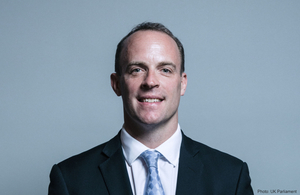
The United Kingdom is doing more to safeguard the rights of British people abroad, by joining a new Canadian-led initiative to condemn and deter the practice of arbitrary detention.
Today’s declaration, welcomed by Foreign Secretary Dominic Raab, increases the diplomatic pressure on those who choose to detain foreign and dual nationals with no legal basis. The UK joined over 55 like-minded allies in committing to enhance international cooperation to end the practice of arbitrary arrests, detentions or sentencing, often used to exercise leverage over foreign governments.
This declaration enhances international cooperation and sends a collective show of strength to those countries who carry out this unacceptable practice. It also reaffirms the essential rights provided under the Vienna Convention on Consular Relations, including the provision to allow consular access to detained nationals.
The UK government already works publicly and privately to condemn the use of arbitrary detention, to support those who have been detained without access to a fair trial and to ensure accountability for those perpetrating this abhorrent act.
Foreign Secretary Dominic Raab said:
The practice of arbitrarily detaining individuals as leverage over another government is indefensible and the UK will not tolerate it.
Depriving someone of their liberty with no legal basis violates fundamental human rights. The UK is proud to stand on solidarity with over 55 other countries to bring this unacceptable practice to an end.
This Declaration shouldn’t be seen as a single action. The UK and the Foreign Secretary will continue to throw our full weight in support of those detained arbitrarily.
The G7 Foreign and Development Ministerial meeting later this year will see the Foreign Secretary and G7 partners generate further mechanisms to uphold international law, tackle human rights abuses and stand up for our shared values.
Associated links
- the Declaration website
- full text of the Declaration
- video of the Foreign Secretary’s comments (WeTransfer file)
Driving forward peacekeeping reform through practical recommendations that address today’s challenges
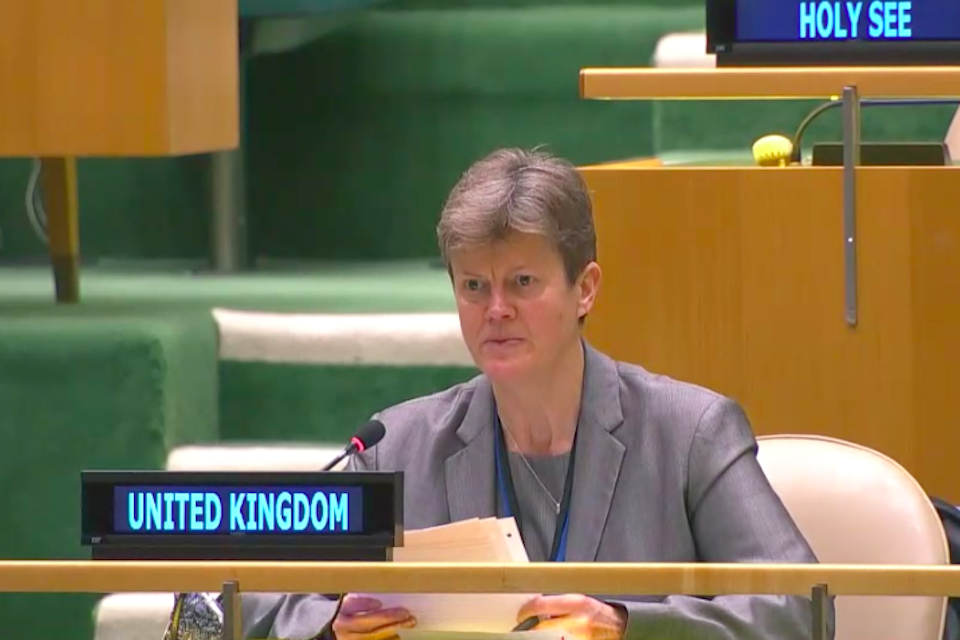
Thank you Mr Chair, and please accept my congratulations on your re-election.
I want to start by commending the dedication and courage of all our personnel in the field, and to pay tribute to the memory of the 129 peacekeepers who lost their lives in 2020. In the last year, the Covid-19 pandemic has only added to the range of challenges our peacekeepers face.
The United Kingdom attaches great value to the work of this Committee in driving forward peacekeeping reform, through practical recommendations that address today’s challenges. While progress has been made in implementing the Secretary-General’s Action for Peacekeeping (A4P) initiative there is, as ever, more that we can do.
This year we have seen the clear benefits of the Comprehensive Performance Assessment System in supporting missions to improve planning and decision-making, including mitigating the impacts of Covid-19. The UK is proud to be funding the roll out of this tool, which we hope to see completed this year.
We welcome the finalisation of the Integrated Peacekeeping Performance and Accountability Framework, setting out clear standards and measures to address underperformance and incentivise outstanding performance. Thorough implementation and reporting on the framework will now be crucial.
Following attacks on peacekeepers in Mali and the Central African Republic in recent months, it is clear that there is more we must do to keep peacekeepers safe. We hope the Committee will agree clear recommendations on improving situational awareness, training and equipment, and medical standards.
The UK remains committed to advancing the Women, Peace and Security agenda, and we firmly support the full, equal and meaningful participation of women in peacekeeping and peacebuilding. This is not only the right thing to do, but is also critical to operational effectiveness. To date, the UK has contributed $4.3million to the Elsie Initiative Fund to promote uniformed women’s participation.
Mr Chair, all of us have a responsibility to deliver on peacekeeping reform. The UK is committed to supporting the A4P agenda, including through our extra-budgetary support to the Secretariat and through our own peacekeeping deployments. Last December, the UK deployed a 250-strong long-range reconnaissance group to MINUSMA, thereby filling a key capability gap. This is helping MINUSMA to establish a more intelligence-led approach to peacekeeping, better protecting civilians and peacekeepers.
Mr Chair, we all have a common stake in the peacekeeping system. Let us recognise this as we work together to achieve a renewed consensus in this year’s report. We have every confidence that under your expert chairmanship, and with the support of the Bureau and our co-facilitators, we will be successful.
Thank you.
Welsh Government Ministers have announced £6.5 million to support local authorities and people affected by flooding during the Alert Level 4 lockdown.
The funding will allow local authorities to claim for the costs of responding to flooding including support to residents to address the immediate cost of water damage and replacing necessary belongings.
Welsh Government has already announced it will support households who have suffered flooding in their homes or were evacuated with payments of £500 and £1,000, similar to the support provided during storms Ciara and Dennis last year.
Find out how to be prepared for flooding by visiting the National Resources Wales website, and take a look at the personal flood plans they have designed to help householders and businesses:
- Personal flood plan Personal Flood Plan (cyfoethnaturiol.cymru)
- Business flood plan Business Flood Plan (cyfoethnaturiol.cymru)
- Community flood plan Community flood plan (cyfoethnaturiol.cymru)
Future threats and opportunities: competition for students

(image credit: Pixabay)
The Defence Science and Technology Laboratory (Dstl) has launched a quest to uncover visions of the future from the brightest student minds in the UK.
Entrants must answer the question: what do you believe to be the future threats or opportunities facing UK defence and security over the next 25 years?
The competition is open to undergraduate and postgraduate students currently based at UK academic institutions.
The 5 finalists will be invited to (virtually) present their essay to a panel of senior current and former government officials, before the final winner is revealed.
The winner will receive £250 prize and the top 5 will receive certificates of commendation.
The top 10 essays may be published in a journal style publication.
How to enter
Submit your essays to futuresessaycompetition@dstl.gov.uk
The competition closes on 16 May 2021 and the virtual presentation and announcement of winners will take place in June.
All entrants who place within the top 10 will be asked to submit a picture of their student ID for verification.
Essay guidance
Topic: what do you believe to be the future threats or opportunities facing UK defence and security over the next 25 years?
Your essay can focus on a particular theme or act as an opinion piece.
Suggested themes include, but are not limited to:
- emerging technology and the legal, ethical, technical, moral or policy implications
- societal reactions to advancements in technology or changes in policy
- how does technology affect policy or industry
- emerging misuse of technology
- individual privacy
- strategic advantage and competition
- prosperity and economic strength
- alliances and international relations
- global norms across all domains (including cyber and space) digital freedoms
- pandemic and future policy
- data technology
There is a 2000 word limit (10% allowance).
All essays must follow standard academic rigour and use either Harvard or Chicago referencing styles.
You must include a title and abstract (not included in the word count). The abstract should include key themes and arguments.
Essays will be marked based on the following weighting:
| Marks allocated to | Weighting |
|---|---|
| Academic rigour | 15% |
| Originality of thought | 25% |
| Credibility and relevance of topic | 25% |
| Use of real world case studies | 15% |
| Engaging writing | 20% |
Leeds and London set to become global centres of green finance

- £10 million UK government investment for new world-class green finance research hubs based in Leeds and London
- banks, lenders and insurers encouraged to invest in clean innovations and green technologies from renewable power to sustainable agriculture
- encouraging private investment in green projects will drive growth across the economy and support new jobs as the UK builds back greener from the pandemic
Leeds and London will be home to a new UK centre for driving global green finance and investment, Energy Minister Anne-Marie Trevelyan announced today (Monday 15 February), thanks to £10 million in government investment.
The new UK Centre for Greening Finance and Investment will begin in April 2021, with physical hubs in Leeds and London opening a matter of months later led by a partnership with a number of UK institutions including University of Oxford, the University of Leeds and Imperial College London.
The research hubs in the 2 cities will provide world-class data and analytics to financial institutions and services such as banks, lenders, investors and insurers around the world to better support their investment and business decisions by considering the impact on the environment and climate change.
For example, the new centre will equip banks with the latest environmental and scientific intelligence to help companies of all sizes, including start-ups, anticipate, adapt and gear up for the risks posed by climate change. This pioneering research will also help create new world-leading products and services that tackle climate change, such as cutting-edge technologies that measure severe storms and flood risks for property investors and tools that can improve data on industrial pollution linked to investment portfolios.
These new green finance hubs will also attract and develop new green finance talent from around the world to the UK’s major cities.
This will unlock brand-new opportunities for Britain to lead internationally in greening global finance, positioning Leeds and London as global centres for green finance while also protecting the UK economy and society from climate and environmental risks such as extreme weather events, flooding, major biodiversity loss and water crises.
Following the ambitious commitments laid out in the Prime Minister’s Ten point plan and the government’s Energy white paper, today’s announcement is the latest development in the UK’s drive to build back greener, driving the creation of thousands of new green jobs and leading the world in tackling climate change.
Energy and Clean Growth Minister Anne-Marie Trevelyan said:
Climate change is the biggest issue that we need to tackle to protect our planet for our children and grandchildren. While the government has invested billions of pounds so we can end the UK’s contribution to climate change, we will not reach our net zero target without mobilising private capital and unleashing the power of the free market.
The UK Centre for Greening Finance and Investment in London and Leeds will encourage financial services to turn the tide of their investments and focus on sectors and companies that have a smaller environmental footprint. Doing so will support industries and businesses to develop clean green innovations, creating thousands of jobs across the country – ensuring we build back greener.
Economic Secretary to the Treasury and City Minister John Glen said:
We’ve set the ambition for net zero – now we must ensure our financial sector has the tools and information to get behind the transition. We’re already improving the climate data available by mandating TCFD-aligned disclosures across the economy and implementing a green taxonomy.
This new centre will advance the UK’s leadership in green finance and bring forward the day when firms can access environmental data and analytics for every place on Earth, past, present and future.
It is estimated that successfully reducing climate change and adapting to life in a changing climate will deliver multi-trillion pounds of additional private sector investment every year. The new Centre for Greening Finance and Investment will help divert investment away from unsustainable activities such as deforestation and fossil fuels, and towards low carbon sectors, creating green jobs, building industries of the future, and ensuring the climate and environment at the heart of UK financial decision making.
The Bank of England’s executive sponsor for work on climate change Sarah Breeden said:
Integrating climate and environmental data and analytics into decision making will allow financial institutions to identify, measure and manage the financial risks and opportunities from climate change, and so support the Bank’s objective to ensure the financial system is resilient to these risks and supportive of the transition to net zero.
The Bank of England is delighted that the CGFI will support firms’ efforts in this important area, including for the forthcoming Climate Biennial Exploratory Scenario.
Lord Mayor of the City of London William Russell said:
As we look to build a more resilient post-pandemic global economy, it’s clear that it must also be a more sustainable one. The demand across the sector for deep expertise in the green finance space – such as that which will be provided by the CGFI - demonstrates that the UK is well-placed to take advantage of this opportunity. I’m therefore delighted that the CGFI will introduce a new layer of innovation to the City of London in sustainable finance.
Today’s announcement delivers on commitments made in the government’s 2019 Green Finance Strategy to deliver a pioneering research and innovation programme aimed at enhancing data and analytics on climate and environmental hazards, as well as vulnerability and exposures.
The Centre for Greening Finance and Investment also furthers the Chancellor’s new chapter for UK financial services.
Additional quotes
Chair of the Environment Agency and Chair of the CGFI Advisory Board, Emma Howard Boyd said:
We don’t have time to lose, the benefits of properly pricing climate and environmental risk are estimated to be worth trillions of dollars every year. Closing investment gaps, by avoiding investments in at-risk assets and improving the efficiency of capital allocation across society, will speed up net zero, nature recovery and our preparations for climate impacts like storms and droughts.
Director and Principal Investigator of CGFI and the Lombard Odier Associate Professor of Sustainable Finance at the University of Oxford, Dr Ben Caldecott said:
The Centre for Greening Finance and Investment will allow financial institutions to access scientifically robust climate and environmental data for any point on planet earth now and projected into the future, and for every major sector of the global economy. Doing so will create public goods and unlock innovation.
The UK is perfectly placed to transform the availability of climate and environmental data in finance. We have world-leading capabilities in all the various areas that need to come together to solve the problem.
Executive Chair of the Natural Environment Research Council (NERC), part of UKRI Professor Sir Duncan Wingham said:
Good data and analytics - based on the best science - is fundamental to understanding and managing climate and environmental risk exposure in support of the transition to a more sustainable global finance system.
This investment by NERC and Innovate UK will enable improved access to, and understanding of, physical and transition climate and environmental risks as they impact both sides of the balance sheet. It will help the finance sector to support delivery of a low carbon economy and the recovery and restoration of our natural environments."
UK’s support to global vaccine facility Covax will help Pakistan’s COVID-19 vaccination programme

So far, the UK has committed £548m to the global Covax initiative, making the UK the largest single donor. The Covax initiative is the key way that more than 180 countries will have fair, early access to COVID-19 vaccines. The UK has also encouraged other countries to contribute over $1bn to Covax. Through the Covax facility, Pakistan will take delivery of 17m doses of the UK-developed Oxford University-Astra-Zeneca vaccine shortly, with the first 7m expected before April. The next 10m doses will come later, likely before June. This will help protect 8.5m people from the virus, which has already claimed over 12,000 lives in Pakistan.
Overall, Covax - which stands for Covid-19 Vaccines Global Access Facility - has committed to supply Pakistan with vaccines for 45m people this year alone. Covax is an international initiative to support the discovery, manufacture and fair distribution of COVID-19 vaccines for one billion people by the end of 2021.
British High Commissioner Dr Christian Turner CMG said:
The people of the UK and Pakistan have come together to fight COVID-19.
The Covax facility has been the main way the world has united to make sure all countries get the vaccines they need as quickly as possible, including Pakistan. The UK has been a world leader in supporting Covax, and Covax has committed to supplying Pakistan with COVID-19 vaccines for 45m people this year.
The UK has stood shoulder-to-shoulder with Pakistan in pandemic, pivoting around £20m of UK aid to help Pakistan fight the pandemic. This includes funding the World Health Organization (WHO) since April 2020 to build laboratory testing capacity through training and provision of equipment across Pakistan.
The UK has so far pledged up to £1.3 billion of UK aid overall to end the coronavirus pandemic as quickly as possible. This includes up to £829 million for the development and distribution of new vaccines, treatments and tests, and £5 million for other critical COVID-19 research and development.
The UK is also at the forefront of efforts to drive unprecedented global collaboration and resourcing for the development and delivery of new vaccines, treatments and tests at the speed and scale required. The UK-hosted Global Vaccines Summit on 4 June 2020 raised US$8.8 billion from 32 donor governments and 12 foundations, corporations and organisations to replenish Global Vaccine Alliance (GAVI) funding over the coming five years. This will help support the delivery of life-saving vaccinations in 68 countries and will be integral to the distribution of a coronavirus vaccine once it is developed.
Robust border regime comes into force

From today (Monday 15 February), if you have been in a high risk destination on the UK’s ‘red list’ – comprised of 33 hotspots with COVID variants in circulation – you will have to enter England through a designated port and have pre-booked a quarantine package to stay at one of the government’s managed quarantine facilities.
Those arriving from today onwards that have not visited a red list country must still quarantine for 10 days at home and complete 2 mandatory COVID-19 tests on the second and eighth day after arriving.
The government has tough measures already in place requiring all travellers into the UK, from any location, to provide proof of a negative COVID-19 test taken no more than 3 days before departure and non-UK residents from the 33 red list countries are already banned from entering Britain.
Health and Social Care Secretary, Matt Hancock, said:
As this deadly virus evolves, so must our defences. We have already taken tough action to limit the spread, protect people and save lives.
With the emergence of new variants, we must go further. The rules coming into force today will bolster the quarantine system and provide another layer of security against new variants at the border.
These new measures are important to protect our vaccination programme, which has now seen 15 million people vaccinated, we all work towards restoring normal life.
The new measures that have come in to force today will further strengthen the UK’s borders, limit the spread of new COVID-19 variants and potentially save lives.
The tougher quarantine restrictions also carry heavier fines and penalties with potential prison sentences of up to 10 years.
Enforcement of new regulations
The government has also put in place new regulations equipping Border Force and police staff with the powers needed to ensure people arriving in England conform to the new rules.
Border Force have the power to issue fixed penalty notices to individuals suspected of lying on their passenger locator form and where necessary detain them for up to 3 hours.
As part of the regulations, a requirement for quarantining individuals to self-isolate in their room is set out in law. There will be also be a visible security presence at the managed quarantine facilities to ensure that people are obeying these rules.
The government has struck deals with 16 hotels so far, providing 4,963 rooms for the new quarantine system, with a further 58,000 rooms currently on standby.
All hotel staff will be fully trained in COVID-secure practices, and all contractors have been instructed to ensure their facilities and services are provided in a COVID-secure way. This includes plastic shields and PPE where necessary.
£300M FUNDING BOOST FOR NORTHERN IRELAND
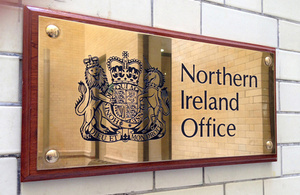
The UK Government has provided the Northern Ireland Executive with an additional £300 million to support people, businesses and public services affected by coronavirus.
This funding brings the total allocated through the Barnett formula to the Northern Ireland Executive since the start of the pandemic to £3.3 billion.
In recognition of the exceptional circumstances and in response to calls for flexibility, the Northern Ireland Executive will be able to carry over any of the £300 million not spent this year into the 2021/22 financial year on top of their existing tools to transfer funding between years.
Chief Secretary to the Treasury Steve Barclay said:
“UK Treasury schemes such as furlough, support for the self-employed and business loans have helped to protect jobs and livelihoods across Northern Ireland.
“But we recognise that the Northern Ireland Executive also has a vital role to play, which is why we are continuing to give them the resources and flexibility they need to support people and businesses through this pandemic.
“I would urge the Executive to use this additional £300 million to help those most in need in Northern Ireland.
Northern Ireland Secretary Brandon Lewis said:
“The UK Government has stood side by side with people and businesses across Northern Ireland throughout the coronavirus pandemic - shielding them from its worst effects.
“The Northern Ireland Executive has received unprecedented levels of funding from the UK Government this year and this additional money, which can be carried over into the next financial year, will give the Executive the certainty and flexibility to deliver on its priorities for the benefit of all in Northern Ireland.”
Following the previous update on 24 December, this is expected to be the final update for 2020-21 as part of the process for finalising departmental funding at Supplementary Estimates.
Further £1.1 billion boost for Scotland's response to COVID-19

The UK Government has provided the Scottish Government with an additional £1.1 billion to support people, businesses and public services affected by coronavirus.
This funding brings the total allocated through the Barnett formula to the Scottish Government since the start of the pandemic to £9.7 billion.
In recognition of the exceptional circumstances and in response to calls for flexibility, the Scottish Government will be able to carry over any of the £1.1 billion not spent this year into the 2021/22 financial year on top of their existing tools to transfer funding between years.
Chief Secretary to the Treasury Steve Barclay said:
From the outset of this crisis people and businesses in Scotland have been able to rely on the UK Government.
UK Treasury schemes such as furlough, support for the self-employed and business loans have helped to protect jobs and livelihoods.
The UK Government will continue to offer this support and to give the Scottish Government the resources and flexibility it needs to fulfil its responsibilities to the people of Scotland.
I would urge the Scottish Government to make the full and best use of this funding as well as their devolved powers to support people, businesses and public services.
Scottish Secretary, Alister Jack said:
This new £1.1 billion funding from the UK Treasury for Scotland’s Covid response is good news and will provide further certainty to the Scottish Government.
This now brings our additional funding to Scotland to £9.7 billion this financial year on top of direct UK Government support to people and businesses in Scotland.
This includes supporting over 900,000 Scottish jobs through our furlough and self-employed income schemes, backing £3.4 billion in loans to Scottish businesses, helping thousands get back into work and investing millions in the development of and supplying vaccines.
The strength of the union and support offered by the UK Treasury has never been more important.
Following the previous update on 24 December, this is expected to be the final update for 2020-21 as part of the process for finalising departmental funding at Supplementary Estimates.
Further info
Any changes to devolved funding are normally confirmed towards the end of the financial year at Supplementary Estimates – but in July 2020 the UK Government introduced an unprecedented upfront guarantee to provide the devolved administrations with funding certainty to respond to COVID-19 this year. A full explanation of the Barnett guarantee can be found here.
The agreed arrangements the devolved administrations have to move funding between years is set out in Chapter 10 of the Statement of Funding Policy.
Further explanation of the Supplementary Estimates process can be found here.

No comments:
Post a Comment